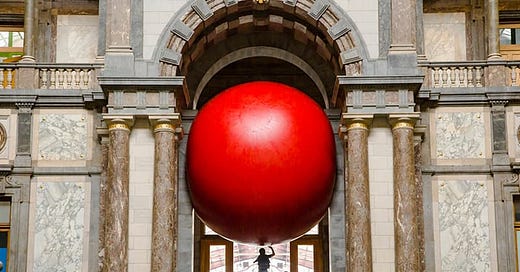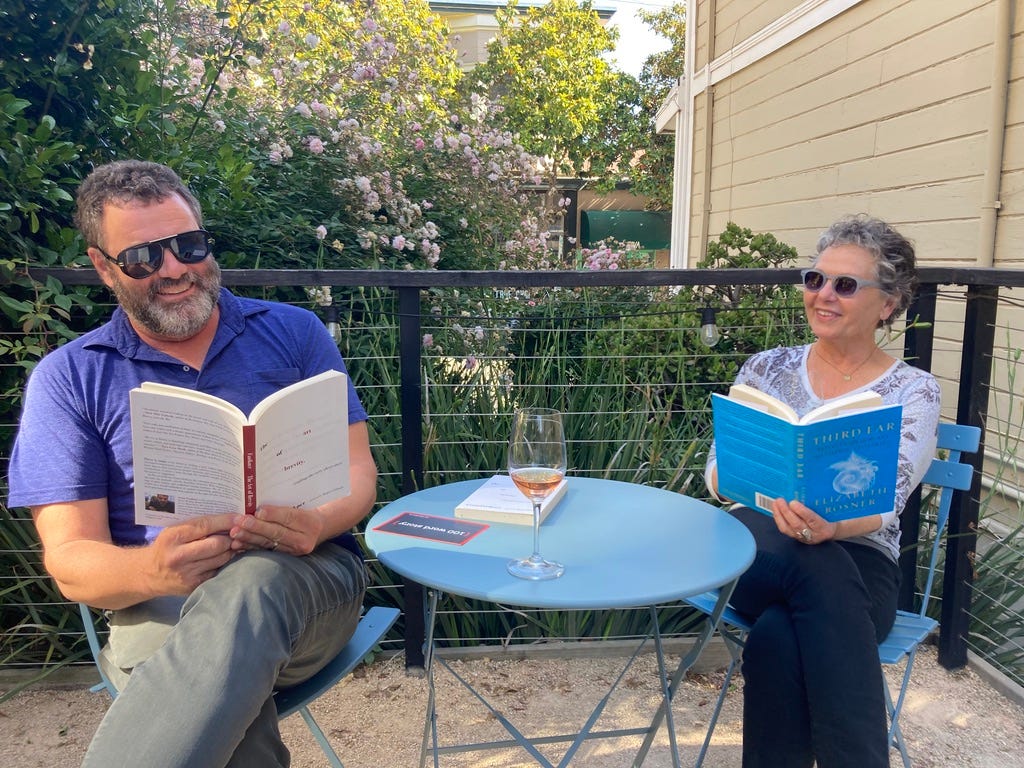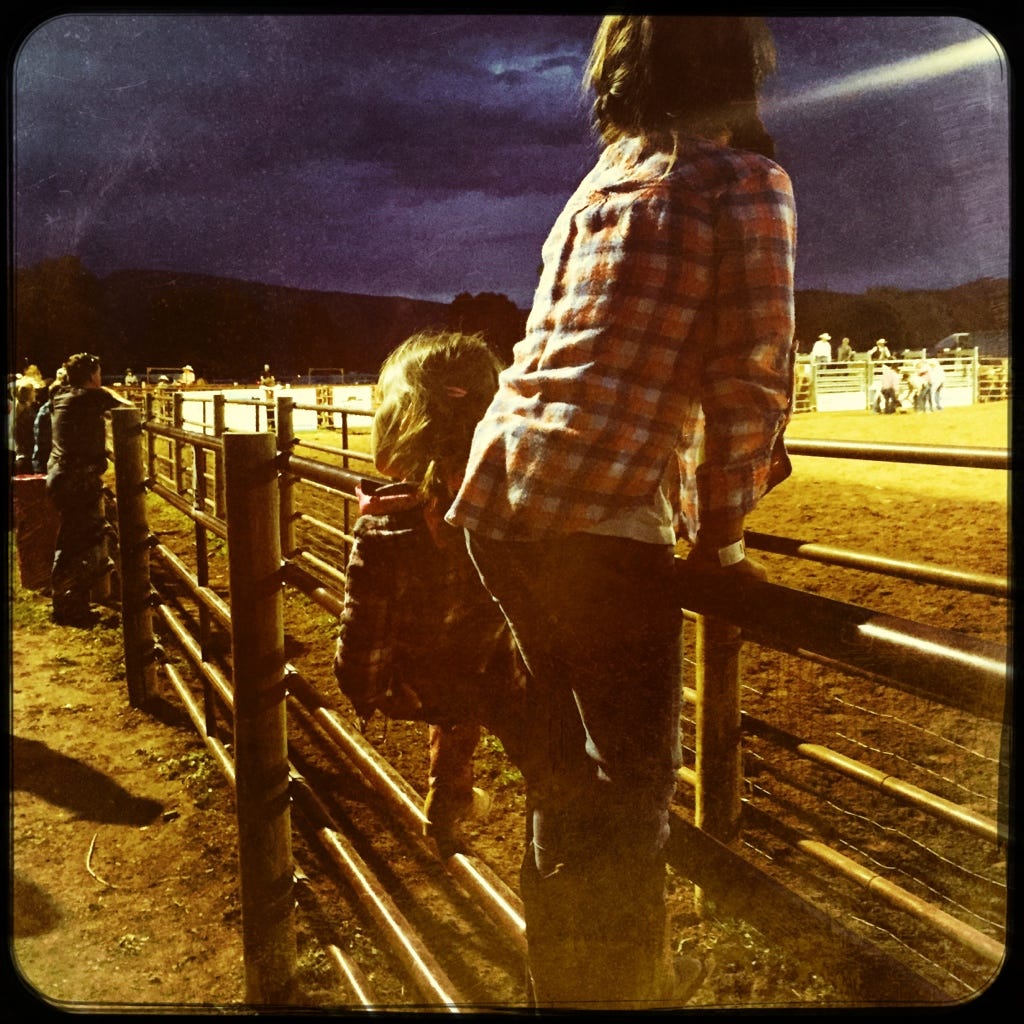A word on play.
A serious word on play.
But, first, did I tell you I’m writing an almanac? Or, an “almanack,” as we’re spelling it, for consistency with the early almanacks.
It’s a very unlikely project. Because I never set out to write an almanack. Perhaps because I’ve never truly read an almanack, and I certainly didn’t plan to start any new writing projects this year—because I’m quite busy … with new business ventures, and one big serious whopper of a writing project (more on that to come … I’m creating suspense here), and life (which is a lot right now with a mom going into a memory care center and an upcoming surgery for me). And more life. And even more life.
But somehow, after introducing June Gervais, who laughs a lot and who wrote Jobs for Girls with Artistic Flair: A Novel, at a reading at AWP, we started writing an almanack together.1
I can’t remember how it happened, but if my memory is right, I read something about an almanac somewhere on the internet, and in corresponding with June, who I knew only through several happenstance encounters in the highways and byways of the glamorous AWP, I mentioned that maybe we should write an almanac together (then spelled without the “k”).
June said yes—she was voted “Most eclectic” in high school, after all—and we set up a Google Doc, and we’ve been leaving little “scatterings” and “smatterings” and “glitterings” and “glamourings” of entries here and there, while doing almanack and almanac research, and just having fun with it, because the almanac(k) seems to bring out the fun in us, even in this forbidding spelling: almanact.
It’s a writing project that fits between the seams of everything else in life. It’s also a writing project that, because it’s fun, is procrastination-inducing.2
This week, June sent me an email, referencing her big, serious, heavy, burdensome novel, which seems similar to my big, serious, heavy, burdensome, onerous, weighty, ponderous, plodding memoir (I’m competitive when it comes to cumbrous adjectives).
June wrote:
“I should probably mentally classify my writing projects the way national parks rate hiking trails, like Easy, Moderate, Strenuous, and hold myself to doing all 3 in a week. Almanack would be Easy because it’s all pleasure and no pressure. Book reviews would be Moderate. Novel is Strenuous for sure, and I should probably start telling myself ‘get your boots on, we’re doing a Strenuous hike today’ so I’d feel more like a badass and less like a disoriented kid who got separated from the rest of the field trip group.”
I made the observation that neither of us had mentioned our “big projects” with anything like joy, so maybe we should think about what we’ve learned from this “Easy” writing that the almanack provides—because it’s an ease that I would like to infuse into my daily writing life just as watermelon infuses the sparkling water I’m drinking now.
So I decided to take a serious look at play …
The state of the modern writer
All writers these days seem to have a game plan, a process, an outlining technique, special software, apps, pings on their phones, data tracking and mood tracking and dietary tracking, dashboards and charts and spreadsheets. A plethora of motivational writing quotes. And more.
To think we used to tell stories around a fire.
A “writing project” sounds like something you do at work, after all. It doesn’t sound like something you do in a sandbox or on a playground. At one time, it was something I didn’t do with a pen. That’s because everything I did with a pen was fun.
Please take a moment and think of all of the metaphors you can conjure for a pen—as in it’s a rocket ship that takes you to other worlds, a dance partner, a magician, a hall of mirrors, a telescope, a roller coaster, and more (I bet you have better ones).
A pen was my primary vehicle to life back when I first started writing as a young child who just liked to imagine stories, who didn’t really know what the word “project” meant if you can imagine that.
That’s because my pen (and me by implication) was playful.
We’ve arrived at the stage in human history (let’s call it the “Productivoscene era”) where anything like play is distrusted. It’s good for kids in preschool. It’s good for adults on the weekends (after they’ve taken care of the yard, shopped for groceries, and hit their cardio goals). It’s good as a creative warm-up. It’s good for team bonding.
But it’s not something that is at the true center of any “project.” Because that’s not the definition of a project.
Play can’t be tracked and charted. It doesn’t fit into that new novel outlining software you just bought (so it might not be part of writing?).
Even though every creator knows its value and espouses taking time for it, it’s exactly that: something we now take time for.
That sounds very adult, doesn’t it—to take time, make time, for play?
Play relies on uncertainty
Adults didn’t seem very happy to me as a kid, and they don’t seem very happy to me as an adult. What’s the one thing that happens when kids change into adults (other than growing a lot more hair on their bodies)?
Play. Or an absence of play. Adults don’t really know how to play. It’s strangely a “skill” we’ve lost.
Here’s what I think of when I think of play—other than it’s fun.
When you’re not working your imagination to fuel your project with words on the page, your imagination is actually this thing that’s made up of love and generosity. Your imagination wants to conjure and frolic and share. It wants to meet others and hear their stories and … play with them. Which is an amazing form of love and joy.
Playfulness likes to be unplanned, without rules, without limits, which is why recess has always been a flawed concept. Play shouldn’t exist in strictures, but flow through every stage of the school day or the novel-writing day or, yes, the project day.
Play is fundamentally instinctual, and even though we tend to distrust instinct in this Productivoscene era (perhaps because there’s not an app to measure instinct), I like to think of how many of my best thoughts, decisions, and actions were actually purely instinctual.
Or, rather, all of my best thoughts, decisions, and actions. I’ve never conjured the poetry of a story with any planning tool or craft book.
Play isn’t a means to an end, but a beginning to a beginning
Play relies on uncertainty—it relies on an open-endedness of life. It doesn’t have a technique or a craft. You shouldn’t work at play. You have to play just for the sake of play (otherwise it’s not truly play). Play isn’t a means to an end, but a beginning to a beginning.
Play shouldn’t be dismissed as frivolous, as a questionable use of time, with no truly important real-world applications. We shouldn’t view our creative processes as something to organize and make more efficient—as if creativity is a business process.
What if we conceived of our words not as something to serve our various projects but as something to serve play? What if the point of our writing was play itself?
What if play wasn’t something that we did in the various nooks and crannies of recess in our lives, but something that is a part of everything we do throughout the day?
What if we place our trust in uncertainty and live in an open state of curiosity? What if we write for fun, write to feed our imaginations, write to revel in the childlike wonder of being elsewhere.
Wait a minute. Let us pause there.
One definition of adulthood is the constant desire to be elsewhere—to dream of life in the future or in that place you can move to for a simpler, less hectic life. I don’t know how this pairs with an increased amount of bodily hair growth, but I think it relates to a malaise that is all too common for the adult species in the Productivoscene era.
The adult’s pervasive desire to be elsewhere is a desire to escape so that we can … yes, play again.
We all want to play. That’s the funny thing. But we don’t have to go elsewhere to do it. We can do it now. In our living room. In our cubicle. Maybe even with our new novel outlining software and in our rather cumbrously cumbersome memoir.
Or in our almanacs and our almanacks and our almanac(t)s. I think we must bring play to our serious projects and make them sandboxes.
Let’s go to recess now and decide that this time it’s not going to end.
And that’s an order!
Today’s prompt:
Skip down the street. Then skip up the street.
Please become a paid subscriber …
Or just leave a tip?
Because a quote
“I tell you, we are here on Earth to fart around, and don't let anybody tell you different.”
— Kurt Vonnegut
Wine tasting as storytelling
Every sip of wine holds a story. Elizabeth Rosner, the author of Third Ear: Reflections on the Art & Science of Listening, and I are going to host a wine tasting event at Vintage Berkeley (the most charming wine shop in the world) to go deep into your senses and listen to a wine's stories—and your stories (and then write them).
Immerse yourself in sense memory much like Proust did with his madeleine.
When: Friday, June 27, starting at 6, and who knows when and where it will end.
Upcoming events
July 12: I’m teaching The Art of Brevity at the Mill Valley Library from 12:30 - 1:30 p.m. Find out more.
July 24-27: I’ll be teaching at the new Understory Conference in Park City, Utah, with a bunch of other great teachers, including Dani Shapiro and my Memoir Nation partner
. Find out more.Contact me about my one-on-one work with writers
Because a photo
It’s summertime. Which means it’s time to play Jonathan Richmond’s That Summer Feeling.
Yes, THE June Gervais who was deemed “Most Eclectic” in her senior year (nearly as impressive as my honor of being voted “Most likely to move furthest away”).
People ask me the key to successful collabortion. It’s quite easy: choose someone much more talented than you are.








Oh, you KNOW I love this post! (Even if you hadn’t mentioned me in it!) Yes to all of these observations. Even the word “project” has a playful energy to me, actually—redolent of childhood art projects, glitter & crayon shavings. I will enter my creative week in that spirit. PS In your kindness, you revised my high school award to “Most Eclectic”, which is more complimentary than the actual award, which was “Most Eccentric” (aka Class Weirdo). 😆
I love this so much! It reminds me of Lynda Barry writing about how as kids we draw for fun, and then when we grow up we don't draw any more because we think we aren't good at it or have no reason to do it because it's just playing around and we have become SERIOUS. I always try to keep this in mind, and remind myself 1000 times to write for the FUN of it like I did as a kid. You're right. These days with so many 'how to' offers and guides and gadgets, the play can get trampled over.
So, now I'm going to put on some Jonathan Richman and dance.